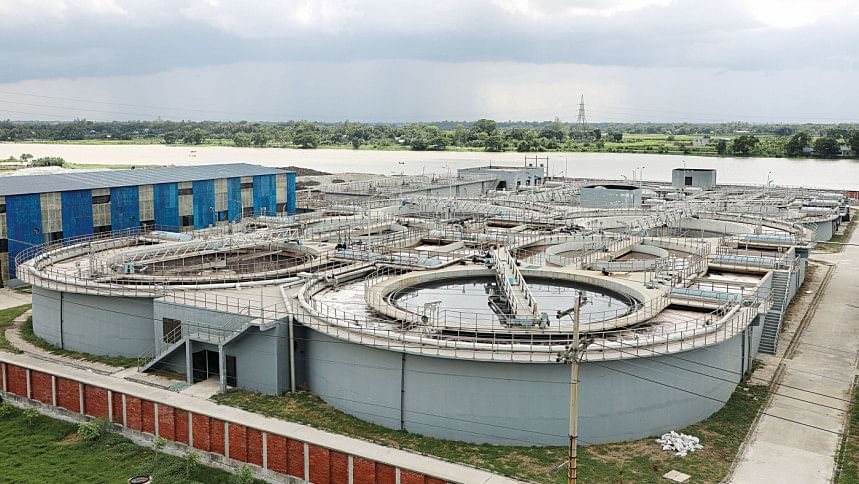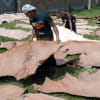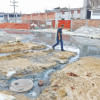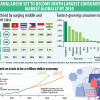Allow more private ETPs in Savar tannery estate

The government should allow more private companies to build effluent treatment plants (ETPs) inside Savar Tannery Industrial Estate (STIE), said Shaheen Ahmed, chairman of Bangladesh Tanners Association (BTA), yesterday.
This will not only develop the leather and leather goods industry but also brighten its image across the world, he said.
Local exporters are being deprived of standard international prices for not obtaining certifications of Leather Working Group (LWG), a global body for compliance and environmental certification in the leather and leather goods sector.
Local tanners have been selling tanned skins of cows, goats and buffalos at almost half the standard international prices to non-compliant buyers, especially Chinese ones, as they could not obtain the LWG certifications for poor compliance to workplace standards.
Local tanners have not been obtaining the LWG certifications as the construction of the central ETP at the STIE could not be completed although over Tk 500 crore has been spent so far.
So far, the government allowed only two private companies to construct their own ETPs at the STIE, enabling availing the LWG certifications, as a central ETP is yet to become functional.
"The government should allow at least 30 private ETPs now for obtaining the LWG certifications so that we can get better prices from the international retailers and brands," Ahmed told a seminar on "action for sustainable development of leather industry".
Currently the second largest export item, leather and leather goods export from the country fetched $1.12 billion in the July-May period of the current fiscal year registering a 0.42 per cent year-on-year growth, according to data from the Export Promotion Bureau (EPB).
In fiscal year 2021-22, earnings of the leather and leather goods sector amounted to $1.24 billion.
Bangladesh has a target to export tanned hide, leather and leather goods worth $12.50 billion at the end of 2030 as the demand for the locally made leather goods has been increasing worldwide.
Over Tk 10,000 crore has been invested in tanneries in Bangladesh after their relocation from Dhaka's Hazaribagh to their current location at Savar.
"So, we need more local tanners to obtain the LWG certification so that we can make good business with strong reputation," said Ahmed.
The BTA, The Asia Foundation and Economic Reporters' Forum (ERF) jointly organised the seminar at the ERF office in Dhaka to disseminate knowledge on the rawhide, leather and leather goods industries ahead of Eid-ul-Azha which is scheduled to be celebrated at the end of this month.
Almost every year in the recent past the rawhide traders and growers have faced a crisis for lowering prices. More than 50 per cent of rawhide sourced annually is collected during Eid-ul-Azha.
This year too, it is expected that a total 85 lakh animals will be sacrificed during the Eid. Of the number, some 45 lakh are cows and 40 lakh goats, buffalos and lambs, Ahmed said.
Abul Kalam Azad, president of Tannery Workers Union, said the relocation of the tanners from Hazaribagh to Savar did not happen properly as the main component, the central ETP, was yet to be functional although a few hundred crore taka has already been spent.
The progress in construction of a modern central ETP at the tannery estate is still slow and the taskforce formed to monitor the progress needs to expedite it, Azad said.
Closure of the tannery estate is not a solution, he added.
Ferdous Ara Begum, chief executive officer of Business Initiative Leading Development (BUILD), said branding of the sector was very important and obtaining LWG certification in bronze category may not work for the better.
She also suggested that the government provide assistance in the sector and allow foreign direct investment.
Kazi Faisal Bin Seraj, country representative of The Asia Foundation, spoke on the role of the media for the sector.
BTA Chairman Ahmed and Rehana Akter Ruma, head of project and programme of the BTA, presented a keynote paper. Tamim Ahmed, a senior research associate at the Centre for Policy Dialogue (CPD), presented another paper.
Md Sadat Sadruddin Shibli, a director at The Asia Foundation, moderated the seminar. Mohammad Refayet Ullah Mirdha, president of the ERF, and Abul Kashem, general secretary to the ERF, also spoke.

 For all latest news, follow The Daily Star's Google News channel.
For all latest news, follow The Daily Star's Google News channel. 







Comments